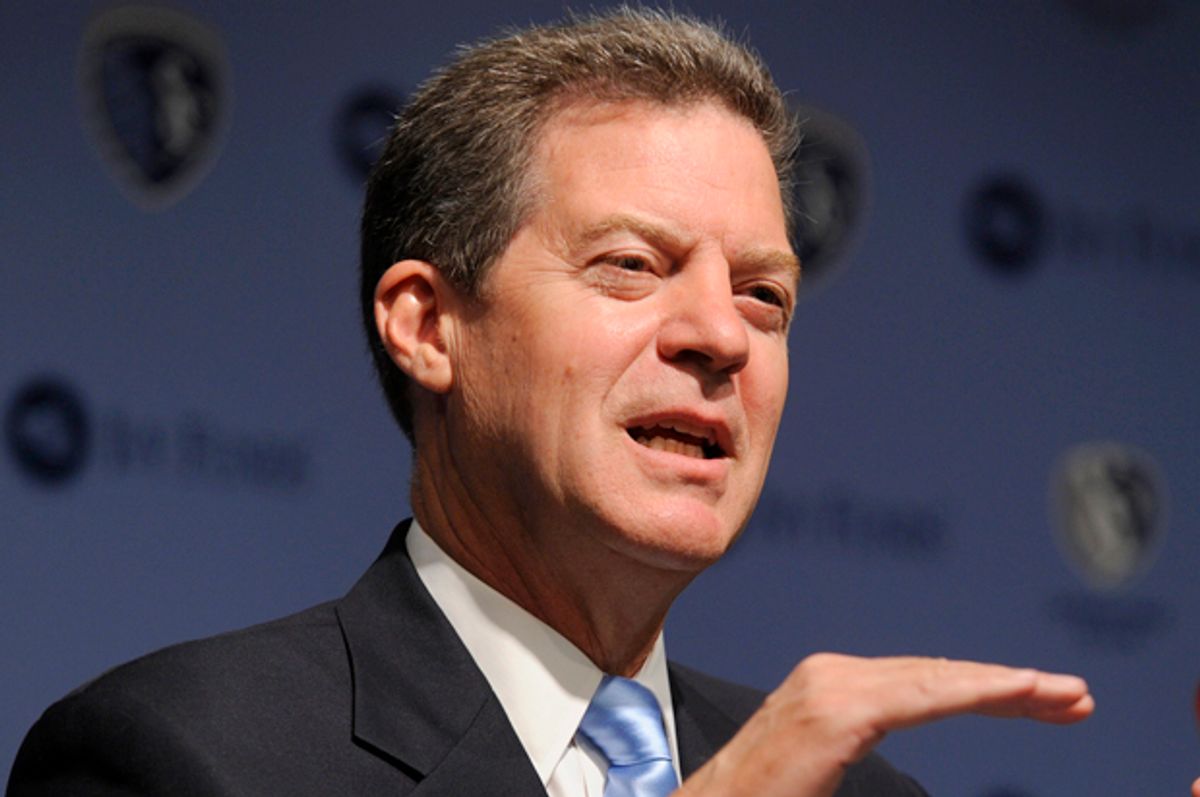In the summer of 2012, shortly after the Supreme Court upheld the Affordable Care Act, Kansas Gov. Sam Brownback went on CNBC and said his state would have no part of the federal health law. Participation with the ACA came with too many strings, he explained, and the whole endeavor was just too expensive for a responsible, fiscally conservative red-state Republican like himself. “This thing is a budget-buster of gargantuan proportions,” Brownback said.
A little more than two years later, Brownback is working desperately to deal with a budget crisis – a crisis he created himself by pursuing a radically conservative economic agenda that imposed deep tax cuts with the promise that they would stimulate economic activity and pay for themselves. That promise hasn’t panned out (it never pans out) and state revenues have plummeted. Since the good governor refuses to raise taxes, Brownback had to find ways to plug up a yawning $280 million shortfall. And you’ll never guess which “budget-buster” of a federal law is helping Brownback fill the gaps in his busted budget.
The Kansas Health Institute reported last week that in order to close the budget gap, Brownback is using $55 million from “a Medicaid drug rebate program that was expanded as part of the federal Affordable Care Act.” As KHI explains it, the Affordable Care Act “increased the refunds that pharmaceutical companies must pay states for prescriptions provided to Medicaid patients and allowed states to collect rebates for Medicaid prescriptions administered by managed care organizations.”
As TPM’s Dylan Scott notes, “there are no legal restrictions for what states can do with the Medicaid rebate money,” though “it has historically been used to help pay for the state's Medicaid program.” So now this additional cash, instead of helping to pay for healthcare for low-income Kansans, will be used to help pay for Brownback’s tax cuts.
And, again, Brownback has no intention of relenting even an inch on his tax policy, which is largely to blame for the state’s budget woes. His preferred solution is to squeeze funding from state programs so that it can be diverted to the general fund. (Highway funding and the state’s pension system have already felt the pinch, as have “lawsuit settlement funds from tobacco companies normally dedicated to children’s programs.”) The fixes he’s pursuing are mostly short-term, one-shot deals, and their overall effect is to simply put off the fiscal reckoning to a later date, at which point it will be even worse. “Research staff anticipates the budget gap growing in the next fiscal year from previous projections of $436 million to $648 million,” reports the Kansas City Business Journal.
When you factor in other obligations the state government is legally obligated to meet, Brownback could be in the position of having to find “$1 billion in cuts in the next fiscal year in a budget of around $6 billion.” His short-term budget fixes have, thus far, not eaten into state funding for education or Medicaid, but they could soon be on the block given that the problem is only getting worse. The beast can only be starved so much, so either Brownback needs to pull off a supply-side miracle, impose even more draconian spending cuts, or do the unthinkable and *gasp* impose a modest tax increase.
But for now it’s full steam ahead for his radically conservative tax policy, which endures only because successful government programs like the Affordable Care Act are there to help subsidize Brownback’s economic fantasy.



Shares